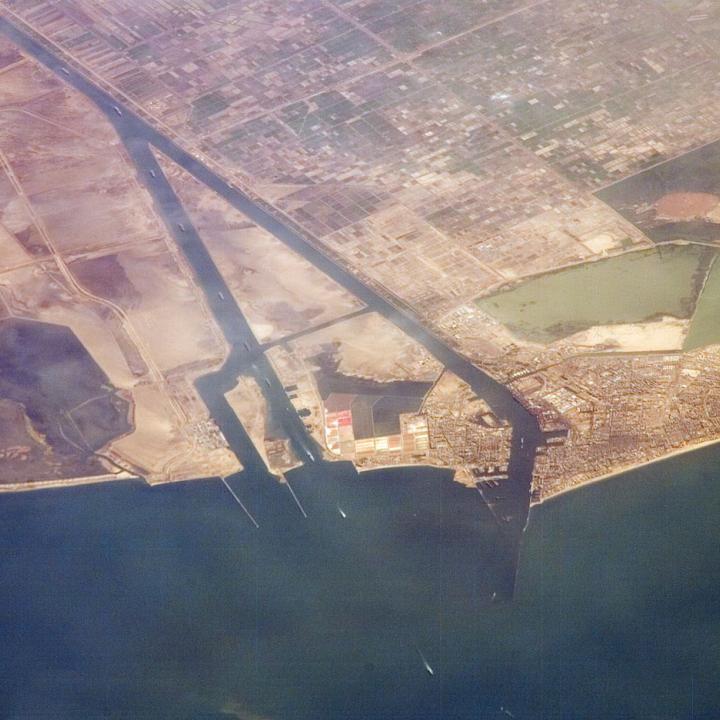
The Suez Canal From Nasser to Sisi

August 13, 2015
In a majestic display, Egyptian President Abdel Fattah al-Sisi has inaugurated his first large-scale project as president: a new branch of the Suez Canal, known as “the new Suez Canal.” Although the Muslim Brotherhood and much of the Western media are skeptical about the project’s benefits, with its new structure Sisi’s government attempts to prove to Egyptians and the world that Egypt’s stability is ultimately dependent on national projects, despite increasing terrorism and a deteriorating economy. Ultimately, the New Suez Canal suggests that there are ways for the Egyptian economy to recover if there is popular willpower to do so and political leadership that enjoys the confidence of its citizens.
In 1956, President Nasser stunned the world with his decision to nationalize the Suez Canal and seize ownership from its former colonially backed company after the international community refused to build the Aswan Dam. In a similar vein, the Sisi government also produced international surprise by managing to fund the largest share of canal project through investment certificates bought by many Egyptian citizens from all classes of society, raising eight billion dollars in just eight days.
The impressive fundraising allowed the 72-kilometer-long branch of the canal to open in one year rather than the originally projected three years. The analyses of economic experts remain divided between optimism about the project’s benefits and pessimism due to sluggish global trade as a result of the financial crisis that is currently sweeping Europe. Nonetheless, the Suez Canal Authority predicts that the new expansion will boost the number of ships transiting through the canal daily from 49 to 97 ships by 2023, and the government is predicting an increase in revenue from the canal from currently 5.3 billion dollars to 13.2 billion dollars by 2023. These projects depend though on global trade levels and continued improvement of the Canal’s efficiency.
It should be noted that the Suez Canal has a special significance for Egyptians, since many Egyptians sacrificed their lives while digging original 193-kilometer canal linking the Red Sea and the Mediterranean in 1859. The construction of the canal took over a decade and heavily featured the efforts of tens of thousands of Egyptian peasants, almost a fourth of the total population, who were pressed into service by corvée. During construction, many Egyptian deaths resulted from hunger, thirst, disease, and torture. One hundred years later, Nasser’s nationalization of the canal became a major point of Egyptian pride and opened the way for other large-scale national projects, such as the Aswan Dam, and new iron and steel factories.
With the apparent success of the New Suez Canal, there are several steps that the Egyptian government can take to ensure that this success is a permanent one. Crowdfunding is a viable option for other national projects in all fields, including culture, industry, agricultural, and tourism. These national projects could be key to helping the Egyptian economy recover. In this context, economic progress is the only sure way for Sisi’s government to increase its popularity and remain in power. Despite political turmoil and repression of citizen freedoms, the majority of Egyptians no longer take much of an interest in the political and partisan conflicts that have torn the country apart over the past four years since the January 2011 Revolution toppled the Mubarak regime, instead primarily concerning themselves with Egypt’s economy.
Nevertheless, in order to protect these major projects from the threat of terrorism, the Sisi government needs to adopt an alternative approach to effectively combat terrorism. Such an approach would involve measures to back moderate currents of Islam within religious institutions subject to the state, such as al-Azhar and the Ministry of Awqaf. The aim of this would be to spread an enlightened version of Islam among young people to combat the draw that that extremist forms of Islam led by ISIS have among young people in tribal and rural areas of Egypt.
A national strategy is necessary to continue facilitating citizen participation in national projects and government policies that require significant funding. The best means to attract citizens to contribute is the experience of successful citizen-funded projects, and the New Suez Canal provides a key first step. But such a measure is a double-edged sword. Citizens could lose trust if government is not transparent about the benefits and the financial rewards for each participating citizen – even if the citizen’s share in the project is very small. An opaque financial transaction with no clear accountability for citizens’ money will inevitably exacerbate public outrage to the extent that it destabilizes the government and Sisi’s regime as a whole.
In a related concern, it is as of yet unclear whether the government will be able to meet the expectations of its investors in the Canal. The promised 12% interest rate for holders of the investment certificates could increase the strain on the public treasury, especially in light of projections by economic experts that the new branch of the canal will not realize actual short-term profits. Moreover, the decline in European trade due to the economic crisis may also decrease the canal’s profits. Therefore, in order to diversify its economic portfolio, the government should encourage small and medium-sized projects in all fields while implementing anti-monopoly policies in order to revitalize the economy without placing burdens on Egypt’s treasury.
Finally, on the political level, the government must work to scale back the current repression and disregard for freedom and social justice and seek to implement separation of powers. For more than seven decades, power has destroyed whoever has held it. Starting with the exile of King Farouk in 1952, all of Egypt’s rulers—Nasser, Sadat, Mubarak, and Morsi—have paid the price for their tyrannical rule. If Sisi is to avoid the fate of his predecessors, his government must carefully manage the people’s money and hopes invested in the New Suez Canal.


